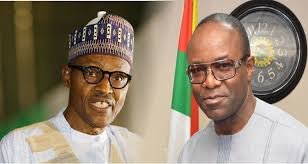Nigeria’s former Minister of State for Petroleum Resources, Ibe Kachikwu, has recently opened up about his time in office under ex-President Muhammadu Buhari, shedding light on behind-the-scenes debates over petrol subsidy, fuel queues, and refinery deals. His revelations have sparked fresh conversations about how Nigeria’s oil sector was managed during Buhari’s tenure.
The Subsidy Question
According to Kachikwu, one of his earliest battles in office was the fuel subsidy crisis. With billions of naira being spent to artificially keep petrol prices low, smugglers were allegedly taking advantage by moving subsidised fuel across Nigeria’s borders. This left Nigerians at home grappling with long queues and recurring shortages.
Kachikwu recalls pushing for Buhari’s approval to raise pump prices or at least review the subsidy structure. But Buhari, known for his populist stance on fuel pricing, was reluctant. At one point, Kachikwu says the president told him bluntly: “If it works, fine; if it doesn’t, I’ll fire you.”
Price Modulation and Vanishing Queues
Rather than outright subsidy removal, Kachikwu introduced what he called “price modulation.” This system allowed for petrol prices to reflect small adjustments based on international market movements.
He claims that within 48 hours of implementing the measure, Nigeria’s notorious fuel queues disappeared. To him, this was proof that subsidy removal—or something close to it—was not only possible but also effective.
The Refinery Dilemma
Beyond subsidy, Kachikwu also points to missed opportunities in the country’s refining sector. He alleges that both Saudi Arabia and Qatar expressed interest in taking over or investing in the Port Harcourt refinery, a deal that could have reduced Nigeria’s heavy reliance on imported fuel.
But Buhari reportedly rejected the offers, preferring local repair initiatives instead. Critics now argue that this decision prolonged Nigeria’s refining crisis, keeping the country stuck in cycles of importation and subsidy dependence.
Populism vs. Policy
The revelations underline a fundamental tension that ran through Buhari’s administration: populism versus reform. Buhari was wary of policies that could anger the masses—especially fuel price hikes—yet the economic cost of maintaining subsidies grew unsustainable.
Kachikwu positions himself as the reformist willing to push unpopular but necessary changes, while Buhari is cast as the cautious leader prioritising political stability over bold restructuring.
Why It Matters Now
Kachikwu’s recollections are not just history lessons—they are shaping current debates under the Tinubu administration, which has made subsidy removal one of its defining policies. By contrasting his efforts with Buhari’s resistance, Kachikwu is subtly highlighting what Nigeria “could have achieved earlier” had tougher decisions been made.
Still, some observers caution that his version of events should be taken with a pinch of salt. Questions remain:
- Was the subsidy truly removed under “price modulation,” or merely adjusted?
- Did rejecting foreign offers for refineries reflect bad judgment, or a bid to protect sovereignty?
- And how much of today’s fuel crisis is rooted in choices made during the Buhari–Kachikwu years?
Conclusion
The back-and-forth between Buhari’s cautious populism and Kachikwu’s reformist claims paints a vivid picture of Nigeria’s oil sector struggles. At its heart lies a familiar Nigerian story: the tug of war between politics and policy, between short-term relief and long-term reform.
As the country continues to navigate the pains of subsidy removal today, Kachikwu’s words serve as both a reminder of lost opportunities and a warning about the cost of indecision.
If you enjoyed this article, explore more insightful stories on iNaijanow and join the conversation on our Instagram, Facebook, X, YouTube for fun, engaging, and up-to-date content.
- Reps Summon Finance, Budget Ministers Over Poor Budget Implementation

- Tinubu, Macron Speak as U.S. Officials Land in Nigeria Over Worsening Security Crisis

- Tinubu Moves to Tackle Insecurity with Fresh Recruitment

Disclaimer: The opinions, views, and information expressed in this article are those of the author and do not necessarily reflect the official policy, position, or views of iNaijanow. The company assumes no liability for any errors, omissions, or damages arising from the use of this information.














Hahah, Kachikwu’s memoir is like a political soap opera! 🎭 If it works, fine; if it doesn’t, I’ll fire you. Classic Buhari! But did raising prices *really* make queues vanish in 48 hours, or was it wishful thinking? 😂 Love how Kachikwu frames himself as the bold reformer while Buhari is the cautious political animal. Sounds familiar! Meanwhile, rejecting Saudi/Qatar for refineries? Talk about missing opportunities! Now we have the Tinubu admin dealing with the fallout, and Kachikwu is like, Hey, I tried that! Maybe next time, someone will actually listen? 🤷♂️ Or maybe Nigeria needs both the political stability *and* the tough reforms? #Nigeria #Politics #SubsidyDrama